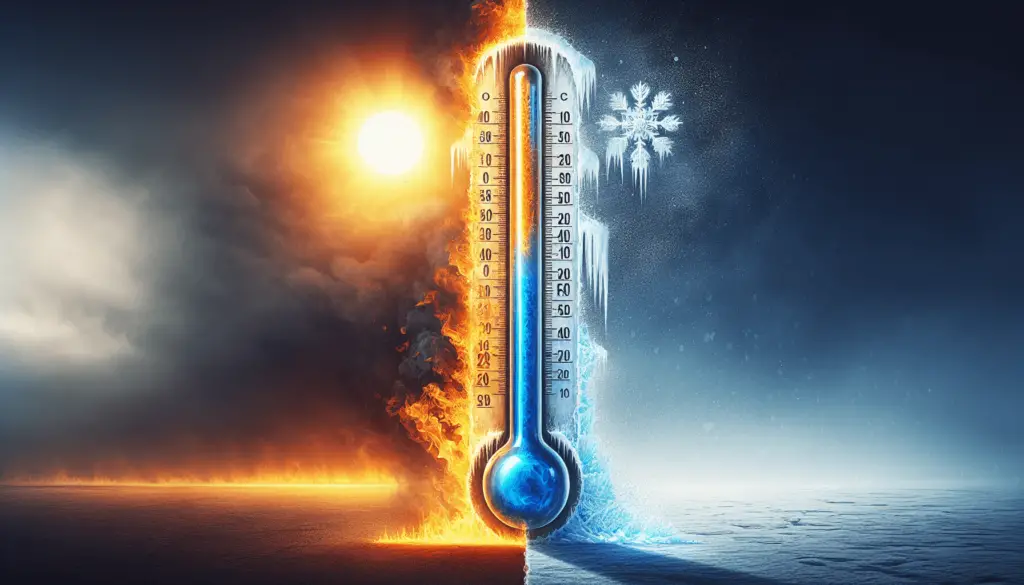Preparing For Extreme Weather: Heatwaves and Cold Snaps
Are you prepared for extreme weather conditions such as heatwaves and cold snaps? It’s important to be equipped with the right knowledge and resources to stay safe and comfortable during these challenging times. In this article, we’ll discuss the best practices for preparing for heatwaves and cold snaps so you can be ready no matter what Mother Nature throws your way.

Understanding Extreme Weather Patterns
Extreme weather events such as heatwaves and cold snaps can have a significant impact on our daily lives. By understanding the causes and effects of these weather patterns, you can better prepare for them.
Heatwaves: Heatwaves are prolonged periods of excessively hot weather, often accompanied by high humidity. They can pose serious health risks, especially to vulnerable populations such as the elderly, young children, and individuals with certain medical conditions.
Cold Snaps: Cold snaps, on the other hand, are sudden and severe drops in temperature that can lead to frostbite, hypothermia, and other cold-related illnesses. They can be particularly dangerous if you are not properly prepared.
Building an Emergency Kit
One of the first steps in preparing for extreme weather is to create an emergency kit that contains essential items to help you weather the storm. Here are some items you should consider including in your emergency kit:
| Item | Quantity | Purpose |
|---|---|---|
| Water | 1 gallon per person per day | Hydration |
| Non-perishable food | 3-day supply | Nutrition |
| Flashlight | 1 | Illumination |
| Batteries | Extra sets | Power for devices |
| First aid kit | 1 | Medical emergencies |
Having these items readily available can make a huge difference in your ability to stay safe and comfortable during extreme weather events.
Staying Informed
Keeping abreast of the latest weather forecasts is crucial in preparing for heatwaves and cold snaps. Be sure to monitor local news outlets, weather websites, and emergency alert systems for up-to-date information on impending weather events.
Heatwaves
During a heatwave, it’s important to stay hydrated, avoid strenuous physical activity, and seek out air-conditioned spaces to stay cool. Be sure to check on vulnerable individuals such as elderly neighbors or family members who may need assistance during extreme heat.
Cold Snaps
When a cold snap hits, make sure to dress in layers, stay indoors as much as possible, and seal any drafts in your home to retain heat. If you must venture outside, be sure to wear appropriate cold-weather gear such as hats, gloves, and insulated jackets to protect yourself from the cold.
Protecting Your Home
Your home is your sanctuary, so it’s important to take steps to protect it from extreme weather conditions. Here are some tips for safeguarding your home during heatwaves and cold snaps:
Heatwaves
- Use blinds or shades to block out the sun and keep your home cool.
- Install ceiling fans or portable fans to circulate air and reduce indoor temperatures.
- Consider planting trees or shrubs around your home to provide natural shade and insulation.
Cold Snaps
- Insulate your pipes to prevent them from freezing and bursting.
- Keep your thermostat set to a comfortable temperature to avoid excessive heating costs.
- Stock up on blankets, candles, and emergency heat sources in case of power outages.
Taking these measures can help preserve the comfort and safety of your home during extreme weather events.

Creating a Family Emergency Plan
In the event of a heatwave or cold snap, having a family emergency plan in place can help ensure that everyone knows what to do and where to go in case of an emergency. Sit down with your family members and discuss the following:
Communication
- Designate a meeting place in case you are separated during an emergency.
- Establish a communication plan for checking in with family members.
- Program emergency contact numbers into your phones for easy access.
Evacuation
- Identify evacuation routes from your home and neighborhood.
- Pack a “go bag” with essential items in case you need to evacuate quickly.
- Stay tuned to local authorities for evacuation orders and instructions.
By preparing your family for emergencies ahead of time, you can reduce the stress and chaos that often accompany unexpected weather events.
Seeking Shelter
In some cases, extreme weather conditions may necessitate seeking shelter outside of your home. Here are some potential shelter options to consider during heatwaves and cold snaps:
Heatwaves
- Public cooling centers: Many communities offer air-conditioned spaces where residents can seek relief from the heat.
- Shopping malls: Indoor shopping malls provide a cool and comfortable environment to escape the heat.
- Libraries: Public libraries are often air-conditioned and can be a good place to cool off during a heatwave.
Cold Snaps
- Emergency shelters: Local shelters may open their doors to provide warmth and shelter during cold snaps.
- Community centers: Many community centers offer warm spaces for residents to gather and stay safe during extreme cold.
- Churches or religious centers: Some churches and religious centers may provide shelter and warmth during cold weather emergencies.
Knowing where to go for shelter can be a lifesaver during extreme weather events, so be sure to familiarize yourself with these options beforehand.
Conclusion
Preparing for extreme weather conditions such as heatwaves and cold snaps is an essential part of staying safe and comfortable during challenging times. By understanding the causes and effects of these weather patterns, building an emergency kit, staying informed, protecting your home, creating a family emergency plan, and seeking shelter when necessary, you can weather the storm with confidence and peace of mind. Stay safe, stay prepared, and remember that knowledge is power when it comes to extreme weather.
